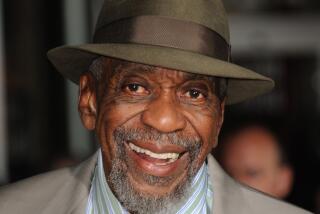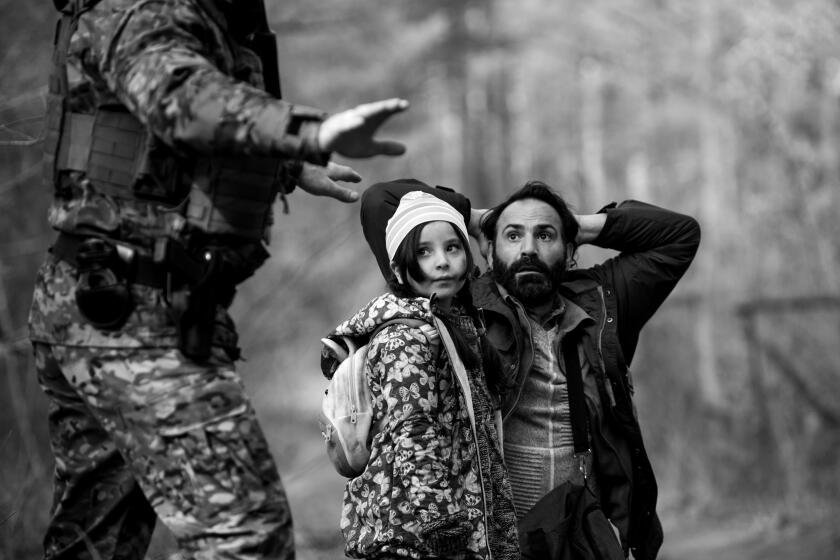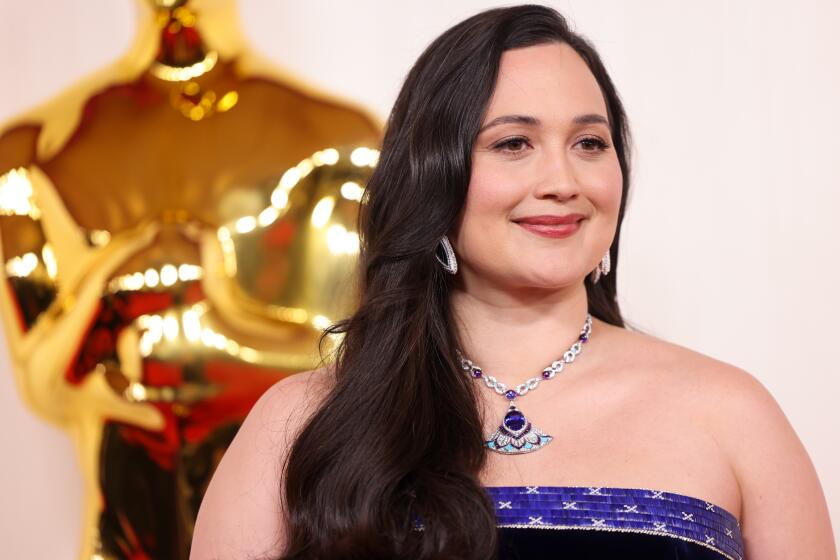Mike Leigh Film Takes Top Festival Honors, Again
In a victory that was all the more satisfying for being both expected and deserved, Mike Leigh’s remarkable, truthful and emotional “Secrets and Lies” won the Palme d’Or Monday night at the 49th Cannes International Film Festival.
“This is quite overwhelming, thank you for all of us who went through hell making this film and enjoyed every minute of it,” said the bearded 52-year-old British director, who won the prize here in 1993 for best direction with his last film, “Naked.”
Getting more passionate as he spoke, Leigh, whose unique work methods ensure his films’ honesty, added that he was especially grateful for the award. “It’s incredibly encouraging for those of us in the international film community who are trying to make films about people, love, relationships, caring, real life, all the things that are important.”
Just as “Naked” won the best actor prize for David Thewlis three years ago, “Secrets and Lies” won best actress for Brenda Blethyn, who plays Cynthia, a London woman who is reunited with the daughter she gave up for adoption and has never seen.
Best known to American audiences for playing Brad Pitt’s mother in “A River Runs Through It,” Blethyn works mostly in theater and television in Britain. Lapsing into Cynthia’s character at the end of her speech, she delightedly screeched, “This is livin’, ain’t it? Thank you, sweetheart.”
“Secrets and Lies,” the only film to gain two awards, also took home a pair of other honors, the International Critics Prize and the top nod from the Ecumenical Jury. Acquired by October Films before the festival, it will be released in the United States in the fall.
This year’s festival was very good overall to English-language features, which accounted for six of the nine major awards. The Grand Prize, the festival’s runner-up honor, went to “Breaking the Waves,” the first English-speaking film from Danish director Lars Von Trier.
Pleading a recurrence of acute travel phobia, Von Trier was unable to accept the award for his claustrophobic and unsettling film about the way a serious accident changes the balance of passion and sacrifice in a marriage between an oil rig worker and his Scottish wife.
Accepting for Von Trier was his star, British actress Emily Watson, whose radiant and unnerving performance was one of the strongest of the festival.
Also benefiting from expert performances was “Love Serenade,” which won the prestigious Camera d’Or for best first film, an especially valued prize because it’s open to movies from the competition as well as from four other sections of the festival.
A savage, self-possessed character comedy set in the end of the road town of Sunray, “Love Serenade” explores the rivalry of two decidedly odd sisters hypnotized by the new man in town, a pompous, self-absorbed disc jockey with a weakness for the songs of Barry White. The debut film of writer-director Shirley Barrett, “Love Serenade” doesn’t totally avoid missteps, but its unity of comic tone is impressive as well as deadly funny.
More familiar to American audiences was the winner of the best director prize, which went to Joel Coen for “Fargo.” Joel and his brother Ethan won three major awards at Cannes five years ago for their “Barton Fink.”
The evening’s most controversial presentation, an unprecedented Special Jury Prize for “audacity and innovation,” went to a Canadian film, David Cronenberg’s “Crash.” Taken from the novel by J.G. Ballard, “Crash’s” cold and unconvincing look at a world where automobile accidents are the ultimate aphrodisiac so split the jury that president Francis Coppola announced from the podium that some members wanted it publicly stated that they had abstained.
Whatever prizes didn’t end up in English-speaking hands went to the French language. The screenplay prize was given to the best of the festival’s several French films, the intelligent and convincing “Un Hero Tres Discret” (“A Self-Made Hero”), co-written by director Jacques Audiard and Alain Le Henry. It stars Mathieu Kassovitz, best known as the director of “La Haine,” as an impostor who constructs a false identity for himself as a hero of the French Resistance.
The best actor award was shared between Daniel Auteuil and Pascal Duquenne, who co-star as a high-powered executive and a man with Down syndrome who teaches him to stop and smell the roses in Jaco Van Dormael’s “The Eighth Day” from Belgium. Yes, it’s as aggressively sentimental as it sounds.
Finally, the prize for superior technique went to “Microcosmos,” a big-bug documentary that mightily impressed those who look on big bugs with favor.
As always happens in Cannes, some of the most satisfying films of the 12-day festival were not eligible for awards because they ended up in auxiliary events.
One of the best of this bunch was “La Promesse” (The Promise), co-directed by Luc and Jean-Pierre Dardenne, brothers from Belgium who started in documentary work and moved on to theatrical features.
Rigorous, uncompromising but still enormously moving, “La Promesse” manages to explore both social issues and the human heart. It focuses on Igor, an amoral teenager who helps his father ruthlessly exploit illegal immigrant labor. Then one of their African workers has a serious accident, and the father’s decision to allow him to die leads to Igor’s uncomfortable discovery of the existence of morality.
Aside from showcasing films, producers and studios also used the festival’s captive media audience to promote work not yet finished. The most anticipated bit was 10 minutes culled from the forthcoming Alan Parker-directed “Evita,” modestly introduced by producer Andrew Vajna as “a new art form; this kind of film has not been done ever.”
In fact, besides having all its dialogue sung (which recalled “The Umbrellas of Cherbourg”), “Evita” resembled traditional wide-screen epics of yore. Adding a modern touch was Madonna, looking remarkably like Evita Peron and, not surprisingly, very much at home as a public-private idol, a role that must have seemed familiar, to say the least.
Although pleased at having put together a strong festival overall, the Cannes hierarchy has already begun to focus on Cannes 1997, the festival’s 50th anniversary, for which a great number of tributes and special events are being planned.
Chief among them, festival head Gilles Jacob announced, will be a “Palme d’Or des Palmes d’Or,” a special award to be given to a living filmmaker who competed in Cannes but never won the top prize. The idea, Jacob said, would be to “make up for mistakes and injustices.”
It ought to be an interesting year.
More to Read
Only good movies
Get the Indie Focus newsletter, Mark Olsen's weekly guide to the world of cinema.
You may occasionally receive promotional content from the Los Angeles Times.







